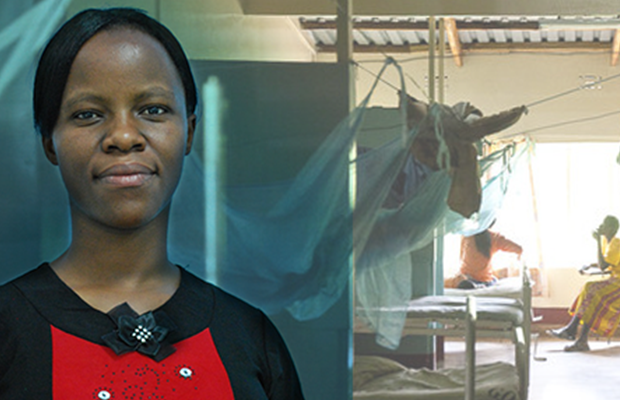
April 2014—Some health facilities are abuzz with health workers attending to patients at every corner. But, the Kyaango dispensary in rural Kitui County, Kenya, has only one health worker.
Lenah Gatwiri is the village’s only registered community health nurse, serving more than 6,000 people. Since her first day at work in 2011, Gatwiri has committed to ensuring the community has access to much-needed health care.
“I’m the records officer, the pharmacist, the nurse, and more. Thankfully, the community supports me by cleaning the facility, which provides me reassurance. When I see people get better and have hope, it keeps me going,” she says.
The Kyaango dispensary is in a remote village that lacks adequate water supply and electricity. The closest health center is 16 kilometers (or 10 miles) from the village, and Lenah refers patients there for their laboratory tests. She says most people do not follow through when they are referred for blood tests because of the cost and the distance they must travel. This makes it difficult to provide high-quality health care.
In June 2013, the Government of Kenya introduced free maternity services in all public health facilities. There was an increase in the number of women seeking these services, but government funds were slow to trickle down to the facility level.
“The changes in maternity and outpatient charges sometimes forced me to dig into my own pocket and procure essential treatment medications. I did this because I am part of the community,” says Gatwiri, who delivers about four babies every month.
The Government of Kenya has since resolved these issues and is now reimbursing health facilities for these services.
Gatwiri keeps the dispensary open weekdays from 8 a.m. to 5 p.m., but she remains on call at all times in case of emergency. She has sacrificed her allotted leave of absence because she did not want to leave the health facility unattended. “I have to consider the challenges the community will face with the dispensary being closed,” she says.
Kyaango is not the only place that needs more health workers. There is a critical shortage throughout Kenya, which means that accessing quality health services is difficult, especially for those living in hard to reach and rural areas.
Gatwiri was recruited and deployed by USAID’s Capacity Kenya Project. In total, more than 1,000 health workers were deployed to fill critical workforce gaps in underserved areas.
Devolution, which was set in motion after the 2013 general elections, shifts certain government powers and responsibilities from the national government to newly formed county governments. As health services devolve, the management and deployment of health workers will be taken over by counties. The Capacity Kenya Project, which runs from April 2009 to April 2014, is working with county governments to prepare for this transition.
A strong, well-functioning and sustainable health system is vital to improving the health status of Kenyans.
USAID works closely with the Government of Kenya to train, manage and retain skilled health workers, and deploy them to areas of the country that need them the most. The project is part of a broader effort to strengthen and improve the Kenyan health system through human resources in public, private and faith-based facilities; leadership and management; health financing; commodities and information management systems.
Links
Follow @USAIDKenya, on Facebook







Comment
Make a general inquiry or suggest an improvement.